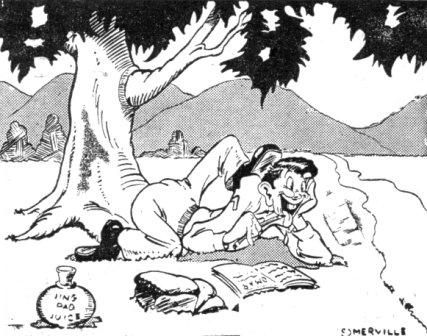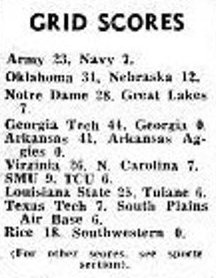

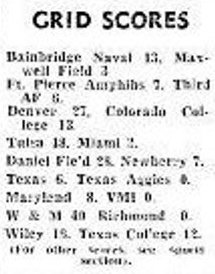
VOL. III NO. 10 REG NO. L5015 DELHI, THURSDAY NOVEMBER 16, 1944
NORTH BURMA JAPS MYITKYINA - (UP) - Tanks, bazookas and flame throwers will be used by American troops in the present campaign against the Japs in North Burma, Lt. Gen. Dan I. Sultan, India-Burma commander, revealed this week, at which time he disclosed that he will be in command of all Chinese troops in the Theater. Sultan predicted strong opposition from the Japanese, and said of the present lull in North Burma fighting, "We just haven't run into the Japs yet. The Japs are in for a hard time." Sultan revealed for the first time the existence of two Chinese armies in North Burma, the new Chinese First Army, commanded by Lt. Gen. Sun Li-jen, graduate of V.M.I. and Purdue University, and the new Chinese Sixth Army, commanded by Maj. Gen. Liao Yao-hsiang. The Chinese First Army is comprised of the 30th and 38th Divisions, the 38th being Sun's old battle-experienced division, and the 30th also being American trained. The Chinese Sixth Army includes the 22nd and 50th Divisions, both of which had regiments in the Myitkyina campaign. Sultan said that American troops are now "in training." He said that the Japs "have a hell of a lot of troops in Burma. I have no reason to believe that the Japs intend to pull out of North Burma." |
Reports from Northern Burma this week indicated that the choice must be made shortly. Two lightning thrusts by Chinese forces, lightly opposed, have gravely imperiled the Japs at Bhamo, while the British 36th Division has slugged its way to within 20 miles north of Katha.
Bhamo is now outflanked by Chinese forces eight miles to the southwest and within one mile of cutting the main escape road to the south. Other Chinese troops are pressing from the east within two miles of the center of the town, near the airstrip.
Commenting on the enemy's plight, Lt. Gen. Dan I. Sultan declared: "The Japs in Bhamo are in another tough spot. The seed with which the Chinese troops overcame resistance and outflanked the town has been remarkable. The Japs in the area might pull another Myitkyina, but their position is hopeless in the long run."
The first important indication of enemy weakness came at Shwegu, a mile-long string of Shan villages cresting the 60-foot-high south bank of the Irrawaddy, halfway between Katha and Bhamo. Two Chinese columns converged upon Shwegu after a spectacular 60-mile, 15-day march over mountains and through swamps from Hopin. There was only a desultory scattering of sniper shots as these forces moved across the 1,000-foot wide river, some in rubber boats, powered by outboard motors, others in native craft, all air-dropped by the 10th Air Force. The Chinese have since advanced eight miles south of the Irrawaddy along a 20-mile front.
In the event the Japs pull out of Bhamo, it will give the Allies territory over which the Ledo Road could be extended toward China, as well as an advanced airbase from which to press the attack southward. Thus, the garrison may have been ordered to remain to fight a suicidal delaying action. Only time will provide the answer.
The 36th Division, commanded by Maj. Gen. F. W. Festing, didn't pause long at Mawlu before hammering southward. The British are now six miles south of Mawlu along the Mogaung-Mandalay railway corridor, endangering the Jap positions of Katha and Indaw.
The Chinese columns which seized Shwegu built their own bridges, cut their own trails and waded through stinking swamps. They were dropped ammunition and food by 10th Air Force planes. The columns struck together across the mountains until they reached "Broadway," original landing strip of the Chindits. Here they split and sloughed southward through the swamps down the Kaukkwe River Valley to Shwegu.
PONS, KOSTELANETZ (MAYBE HOPE) ON WAY
It looks as though the guys and gals in India, Burma and China are going to have a real theatrical season this winter. If (that old bugaboo again) everything goes as planned, here's what stacks up:
Lily Pons has decided to eschew her usual season at the Metropolitan Opera House and, with her husband, Andre Kostelanetz, tour the Far East. It is expected that Pons and husband will get to these shores about Dec. 10. Whenever possible, the diva will sing to the accompaniment of the local G.I. band, under Kostelanetz's direction. If there ain't no local band, she'll sing with the piano. And if there ain't no piano, she'll just sing.
So much for grand opera.
Bob Hope, who has wowed 'em in ETO and the Pacific, is quoted by the United Press as having said, in Hollywood, this:
"I'm heading for the CBI to show up those guys who say screen stars run for home as soon as they get their tootsies in some mud."
The guys who said those nasty things would like nothing better than to have Bob come out and show them up. We have on hand a large supply of crow that we are always prepared to eat.
But, for the record, as of right now, Special Service has no official knowledge of Hope's plans. Bob says he's coming. The War Department hasn't yet notified us.
New China Chief Gives Forecast
CHUNGKING - (ANS) - The military situation in China is "unfavorable but not irretrievable," Maj. Gen. Albert C. Wedemeyer, commanding general of the newly constituted China Theater, told his first press conference upon arrival here.
"Our job is to kill Japs," he said. Wedemeyer also disclosed his command of American forces in the China Theater also includes Indo-China.
In the meantime the Chinese High Command denied a Japanese claim that Nip armies had occupied Liuchow, important 14th Air Force base in Eastern China.
However, 14th Air Force Headquarters announced the American air base at Liuchow, the last remaining one in Kwangsi Province, had been evacuated Nov. 7, and demolitions were carried out in a manner similar to the abandoned base at Kweilin. The 14th announced the decision to give up the Liuchow drome was reached when the Japanese established themselves within three minutes flying time of the base.
Maj. Gen. Claire Chennault personally commended ATC for making a total of 44 trips in bad weather to evacuate personnel.
The Chinese High Command also said Kweilin, 95 miles above Liuchow and capital of Kwangsi Province, has been broken into by the Nips and that street fighting in going on.
|
|
In a letter to Maj. Gen. George E. Stratemeyer, the accomplishments of the Eastern Air Command and AAF units received high praise. Wrote Stilwell:
"Nowhere are there worse conditions to overcome, nowhere have they been attacked with such energy and determination, and nowhere have they been opposed with such success. All branches of air activity - combat, transport, liaison, supply, etc., have set up high standards of performance. Your cooperation and support are appreciated, and you have my best wishes for the future."
To the men of the Northern Combat Area Command, Stilwell sent the following message:
"Now that I am being taken out of the game I want to express my appreciation and thanks for the grand work that you and your staff and all liaison officers have done under very trying circumstances. You have put over a job that seemed impossible and I am proud to have been associated with you in it. You should all feel a fine sense of accomplishment in having had a hand in the creation and successful testing of what will be the basis for a New Chinese Army, with all that may mean to the outcome of the war and the future of China. I keenly regret having to go before the job is finished but I know you have the stuff to carry it through and offer my best wishes for your continued success and speedy return home.
|
Roundup Staff Article
Blocked by bad weather in the Kweilin area for much of this week, 14th Air Force fighters and bombers turned their efforts to the Salween front, where aerial support for Chinese ground forces fighting there roared into high gear.
Four missions of P-40's and two of P-38's bombed and strafed Jap positions in the Lungling-Mangshih area in one day, then returned again the next day to start fires with smoke rising to 5,000 feet. Three missions of B-25's bombed military areas two miles south of Mangshih. P-38's hit a gasoline dump south of Chefang, which exploded with smoke to a height of 4,000 feet, and strafed Mangshih.
In China, Liberators during the week twice bombed Ft. Bayard, the Kowloon docks at Hong Kong and the area east of the airdrome at Samah bay. They also sank a small freighter at night off Hainan Island.
An air offensive against Nip rear lines near Tungting Lake destroyed 37 trucks, damaged 55 more and 20 artillery pieces, and killed many troops and horses north of Hengyang. Rail yards at Kaifeng and Yungcheng and airfields at Paoching and Kingmen were also hit.
Southeast of Kweilin, near threatened Liuchow, 14th Air Force fighters repeatedly struck at Kweihsien, leaving it in flames, and pounded Jap columns and river shipping with heavy casualties and damage.
Enemy interception was met in Thailand, nine Japs attacking a mission which had already destroyed one Nip plane aground at Lampang. Five Jap fighters were destroyed, with two more probably destroyed. One other enemy aircraft was shot down during attempted interception over Paoching. The 14th Air Force had five planes fail to return during the week.
G.I. JEWELER OFFERS ADVICE ON LOCAL STONE MARKET
A week ago we gave you the views of Cpl. John M. Wise, former jeweler, on watch maintenance in the jungle.
This week, Wise crashes through with some educated advice on the local gem markets.
DIAMONDS: Few diamonds have been found in India since 1850. Only the mines of Golconda are still producing a little, the quality of which is below U.S. standards - most diamonds are imported. good diamonds ought to be blueish white in color, perfect cut and with no flaws or coal particles. U.S. prices for stones up to ½ carat is $2.00 for each 1/100th of a carat. Imitations are zircons, white sapphires or glass. Hardness test on glass or with file is no proof, neither is fire test, you've just got to know your stuff.
RUBIES: Mined in India or Burma - the better the red color the finer the stone. Do not buy so-called "Perfect Stones" - even the expert can not recognize them without complicated refraction apparatus. There are too many chances to get gypped. U.S. price is $25 - for one carat stones - more for heavier stones. Imitations are garnets (blackish red) - synthetic rubies which are always perfect in color and purity - almandine (violet red) or plain "bottle glass." Fire test is no proof.
SAPPHIRES: Mined in India - Ceylon. White Sapphires do not have much life and come usually in brilliant cut with 64 or 48 facets and round - U.S. price is $1.00 a carat.
Blue Sapphires come in three general colors of which light and medium blue are better than dark blue. Again I warn against perfect stones, here the same applies as for rubies - however stones not quite uniform in color or imperfect do not have much value, $10 a carat is about the right price. Only imitations are synthetic sapphires or glass. Watch for air bubbles inside - they prove stone is not genuine.
Star sapphires or rubies, mined in Ceylon or India, are both of the same mineralogical and chemical structure - only the color is the difference. Only good stones have value and as long as the star is moving when turning the stone around, that's proof it's genuine. There are crude imitations - no others. Value about $25.00 a carat.
Cat's Eye: The same applies as for Star sapphires - the eye must contract and expand when moved under light.
Emeralds (green)
Amethyst (purple of violet): The only way to safeguard yourself is by buying not perfect stones (with small flaws) or at a really reliable store. U.S. price $1.50 a carat. Only imitations glass but very hard to distinguish.
As final word of advice, I would like to say:
It is all right to buy little souvenirs for our loved ones at home but please, gentlemen, do not believe that you can get rich here with investing your hard earned money in jewelry. Gems have a worldwide value and the Indian merchants are pretty smart. They are certainly not in business to lose.
|
By S/Sgt. EDGAR LAYTHA
Roundup Field Correspondent
BURMA - It was a sunny day in Myitkyina and a very sunny one for the Burma Cubs, a valiant liaison squadron of the 10th Air Force. Their bulletin board surprised them with six awards of the Distinguished Flying Cross, 24 Air Medals and one Oak Leaf Cluster to an Air Medal. The recipients were all enlisted men, sergeant pilots who fly and maintain the breezy little Stimson Sentinels, their baby planes.
The happy Cubs sat near their airstrip, painting their new emblem: A cub bear with a red cross on its forehead, a mailbox on its shoulders. The little bear stood for the little planes, the red cross for the evacuation of wounded, the mail bag for the many thousand letters and Stateside packages the flying G.I.'s dropped to lonely outposts in the jungle. But the Burma Cubs did much more. They adjusted artillery, co-ordinated tank battles, dropped supplies and ammunition, and ferried generals to the front, carried Jap prisoners back. Ann Sheridan, once their
|
We sat under a shady Burma oak. The sergeants related their bold exploits in a dry, matter-of-fact manner. They feel rather casual about their adventures. With the next dawn, these lose for them the military glamour which is always present at the climax of a great escapade. But they love the thrill of taking a Cub plane into action whose only armament is the pilot's pistol.
Almost all the Cubs flew in civilian life. Many are washed out cadets, many were too old to become cadets. All this increased their passion for flying. The strips lie five to 15 minutes from the front and they feel bushed when a day goes by without having been in the air. Once in a while, they are shot down or lost in bad weather. Then they name the strips after their dead buddies. Their main strip is Robertson Field, since T/Sgt. Harold D. Robertson has never returned.
Death always was a close companion of the tall Texan, T/Sgt. James L. Penny, who was washed out at Randolph Field but earned the Air Medal at the famous Seton Strip, a sand bar in the Mogaung River, where a surrounded unit of the Chinese 38th Division was trapped and shelled from both banks. Penny brought in ammunition over the Jap mortars and evacuated the Chinese wounded under fire. He made eight return trips during the day and this was what he felt in the middle of it. "A man is nervous like a donkey . . he feels he is next . . still he has a job to do. He hurries loading the wounded."
My first mission with the Burma Cubs took us deep into enemy territory. The pilot was T/Sgt. Edwin L. Booth, DFC, called "Pop" among the Cubs. Booth, 37, one of the oldest men in the squadron, once owned a garage in
|
The jungle-green face of Northern Burma stretched beneath the little Sentinel like a wide open page of history and by its landmarks we read the squadron's record.
The rebuilt town of Myitkyina and the once bloody Irrawaddy River bathed peacefully in the midday sun. Only the old bomb craters, now filled with stale muddy water, recall a grim past. Fresh green rice paddies in the midst of the yellowing dead ones, water buffaloes in the fields, toiling peasants in straw-thatched hamlets prove new life, new faith.
We dive, the sergeant-pilot points to a village road, shows the spot where T/Sgt. Clifford W. Bryant, DFC, AM, from Hollister, Calif., night landed so audaciously during the battle of Myitkyina. Merrill's Marauders were split into three forces and the leaders of each had to be brought together. Bryant's job was to land in the center of the narrow village road, and pick up a colonel marked with white cloth. Young Bryant fell into a ditch as he stepped from the liaison plane into the night. Somebody helped him instantly to his feet. The colonel.
The plain grows into jungle, climbs into the hills, the Bhamo road beneath us cuts through all. The road is busy. Chinese troops with their mule teams and rice-carrying K.P.'s are moving towards Bhamo. High above them in little clearings on the brow of the mountains, we see the large bashas of the Kachin people.
The thick forest throws its scent to the sun. The aromatic perfume is all about us. The open, windowless little plane seems to sail between the emerald hills and the sky. I forget the Japs, the war, and see our baby plane in a world of peace taxiing tired city people over the Catskills, the Grand Canyon and Yellowstone Park. But we dive again, sink into a clearing and throw the parcels and bundled mail from my lap into the grass where two G.I.'s are waving and waiting. We dive a second time to check whether the mail has been properly picked up. The performance is repeated in other forests on other clearings.
|
We are nearing Bhamo and reach Pagoda 17, which sits like an elegant ivory tiara on the head of a green hill. It is the end of our safe line, but we fly on.
Enemy territory. The trails beneath us are empty, the villages seem lifeless, nowhere a Jap. The uncanny silence of the landscape foreshadows the pattern of the new campaign. The Jap avoids contact to choose his own battleground. Or is he beneath us in the depth of the jungle which testifies so aptly for his sly character? He has never seen a jungle in his homeland but found a home in this war under the covering foliage of tropical forests.
Heading towards Mogaung, the Cub plane wings over the Chin Hills, lands on a silver glade where activity is great. A cavalcade of Chinese soldiers, marching and on horseback, cross the glade, follow little trails into the jungle. Another section of the clearing is littered with parachute silk of all colors. Above us, a large transport plane dives again and again. Its seemingly limitless belly spits large supplies of ammunition, which descend by parachute and are picked up instantly by the Chinese. For them it's manna from heaven. Their C ration cans are very similar to ours. Instead of pork and beans, they get chop suey with soya bean flavor prepared and packed in Chicago. They are equally fond of parachute silk, for they wear it for shorts, shirts, dungarees.
Over the Mogaung Valley, the sergeant pilot points to a bold mountain curve on a road leading into the plain. The curve is flanked from each side by two husky trees whose crowns meet above the center of the curve.
There, underneath the leafy canopy, Sgt. Walter Benedict, from Washington, D.C., made his legendary landing, hurrying blood plasma, ammunition, gun oil to besieged Marauders who were holding tight to our road block.
Another landmark. A meadow which meets the jungle. There S/Sgt. Alvin A. Zellinski, from Cleveland, Ohio, earned the Air Medal for his outstanding performance in tank control. He helped to direct our tanks with special radio equipment against jungle positions they couldn't see. When the battle seemed all over, Zellinski spotted a trailing tank knocked out by enemy fire. He radioed to the leading tank and the men were rescued.
We are almost back in Myitkyina, but there is still the sand bank which brought 21-year-old S/Sgt. Walter A. Oggs, who washed out in Merced, Calif., the Silver Star. A C-47 shot down by a Zero crashed there. Oggs landed, brought first aid, saved the crew.
And, of course, there are more places which tell the liaison squadron's story, but this would go to book length. There are the pilot Sgts. Davis, Goeders, Guthrie, Loescher, Durham, Wester and many others whose deeds were equally daring and brave in the great tales of the slick fiction the Flying Fortress and its cousins naturally have the field. But those men in the jungles will never forget the baby planes and the Burma Cubs. How could they have lived and worked and fought without them?
Captain Ranked By Lieutenant In New Theory
MYITKYINA - Albert is a captain and Elbert is a first lieutenant, but Elbert has outranked Albert all his life by 15 minutes.
Anyway, that's what some of their comrades around here say. First Lt. Elbert Higgins, the twin brother of Capt. Albert Higgins, was born a quarter of an hour before Albert, and therefore claims he's outranked him all through life and will continue to do so, no matter how many times he gets promoted.
The Brothers Higgins, both with Merrill's Marauders, are as like as two tomatoes in a bottle of catsup. In fact, they are so much alike, that Maj. Gen. Frank Merrill ordered Albert to grow a moustache so he could tell Albert from Elbert.
BOTH ONE-EYED
The Higgins brothers, from Texas, are both blind in the same eye, both were commissioned second lieutenants on the same orders, and were promoted to first lieutenant on the same orders; but recently Albert reached the status of captain, although still outranked by Elbert on the precedent-shattering birth theory.
Ex-students of Texas A & M College, from which they were graduated in 1942, the Higgins boys lost out in R.O.T.C. because they were blind in one eye. The commandant at the school, however, got them a commission in the Quartermaster Corps.
QM AND LOVE
"Being blind in one eye - or both - doesn't matter very much in the Quartermaster Corps." said a mutual friend of the Higgins boys, himself in the Field Artillery. "The Quartermaster Corps is like love," said he. The Higgins brothers could not be reached for a statement about the Field Artillery it probably would have been good.
Albert in late weeks has been known as "Hugger" Higgins, a name which was hung on him by Elbert. While Albert was away on leave recently, Elbert sent him a number of mysterious telegraphic messages, signed "Fem," which purportedly were from a lady who had been "done wrong."
The first message said that the fictitious lady was "about to become a mother," and then several days later a message arrived for the perplexed Albert, saying "have become a mother."
So Elbert calls Albert "Hugger" these days. It has not been revealed what Albert calls Elbert since the incident, but perhaps it is just as well polite society doesn't know.
BIGGER B-29 BLOWS
DETROIT - (ANS) - Gen. Henry H. Arnold, AAF Commander, told the Detroit Economic Club this week that the time is coming when thousands of American bombers will visit Japan daily to plaster that enemy homeland just as Allied fliers are crushing the industrial life of Germany today, adding, "Today only long-range B-29's can hit Japan proper, but tomorrow - things will be different."
Liaison Officer Wins Plasters For Burma Job
By HUGH CRUMPLER United Press Correspondent
HQS., SEAC - Lt. Col. Joseph Rockis of this headquarters has been awarded the Bronze Star and the Combat Infantryman's badge for his work as liaison officer supplying rations and ammunition to a crack regiment of the 30th Division during the recent Stilwell campaign in North Burma.
Rockis, 32-year-old former school teacher who has been five years in the Army, was also presented with a samurai sword, taken from a Jap officer, by Col. Yang Yie of the 30th Division, in gratitude for Rockis' work with the unit. He accompanied them in their southward march along the Tanai River, west of the Ledo Road, to Nabum, where they linked up with Brig. Gen. Theodore Wessels' Myitkyina task force.
During the march, Rockis relates, Chinese infantrymen captured what they thought to be three Jap soldiers only to discover the prisoners were Gurkhas of Gen. Orde C. Wingate's "Chindits" who had become separated from their group. Information furnished by these men caused the regiment to alter completely its route.
The colonel believes well-led Chinese are more than a match for the Japs, telling how the enemy lost 300 killed in one engagement between equal forces in the Hukawng, compared to Chinese casualties of 40 killed.
Rockis arrived in the theater in September, 1943, and was promptly posted to an advance area, where he has served all but one month of his year overseas.
Slick Salween Horse Trader Gigs U.S. Vet
HQS., CASAC - Chinese livestock merchants of the Salween country never heard of David Harum, but when it comes to slick "horse trading" they are hard men to "beat," says Capt. Bert Reinow, base veterinarian in the area.
Reinow, veteran of 23 months in Asia who speaks Mandarin, woke one morning with the bright idea of buying a donkey as a pack animal, in lieu of the always-busy jeeps. He repaired forthwith to the local market.
There he found a toothy merchant who had not one, but two donkeys for sale, twins in fact, a jack and a jenny. Reinow glowed at the news, well knowing he could easily resell a jenny when, as and if Ol' Man Rotation touched him with the magic wand. He knew the beast was worth about 3,000 CN; the merchant asked 4,000, so of course Reinow bid 2,000.
After the customary smiles, retiring for tea and taking up the offer again, the deal was cinched for 3,000, an hour and a half later. The Chinaman loaded the animal on the American's trailer cart and departed with his other donkey.
Reinow arrived at base, all smiles, and announced his good luck. "We'll call her Edna," he said, thus bestowing high honor (for the Salween country) on the local Red Cross girl. A friend took one look, said, "I think you better make it Ed."
The Captain winced, conducted a clinical experiment, then screamed, "And me a vet, too!" His Chinese friend had slipped him the jack, and shuffled off with the twin jenny towards the terraced hills.
Y-Forces Liaison Officer Saved Chinese After Attempted Suicide
Y-FORCE OPERATIONS STAFF, SOUTHWESTERN CHINA - Promotion of Lt. William C. Hanna to the grade of captain has recently been announced by Brig. Gen. Frank Dorn of Y-Force Operations Staff.
Coming overseas, Hanna was assigned to the Y-Forces liaison group.
His duties involved frequent trips by pack train to some of the remotest and least-known country in the world, for the captain and his interpreter had to travel from unit to unit along the border, pausing at each to teach the use of panels, smoke and other air-ground signals.
Once, relates Hanna, "my interpreter and I entered a small Chinese village in the mountains. I noticed a lot of excitement and my interpreter began running around like a chicken with its head cut off.
"I finally made out that a Chinese stonecutter, accused of being worthless, had committed suicide. We walked out to a wood pile on the edge of the village and there he lay, a huge gash in his throat, which he had cut with a short, sharp rice knife.
"He had been there 36 hours, as nearly as I could make out, but was still alive, so I sent for hot water to wash the blood off and went to work.
"I sat on his chest to hold him to hold him down, took out a G.I. sewing kit and took 34 stitches in his throat. The thimble wouldn't force the needle through, so I had to pull it through each time with a pair of G.I. pliers.
"After we finished the job, the man was able to talk. We put him on a litter and had him carried about seven miles to a Chinese Army hospital."
Here the Chinese surgeons reopened the wound and resewed it. At latest report, the man was still alive.
According to Chinese custom, the person who rescues a would-be suicide is henceforth responsible for his existence and upkeep, but, says Hanna, "happily the Army and the Y-Force group to which I was assigned moved away."
On another occasion Hanna was a passenger on a convoy which was held up by Chinese bandits.
"They had parked two trucks across the road, blocking it, and we had to stop. The bandits tried to make us give up our guns, but when the smoke died away there were several Americans wounded and several dead bandits along the road. We couldn't go forward, so we put the trucks in reverse and backed out of there."
He is at present stationed as adjutant for the rear echelon of a Y-Force team which accompanied the Chinese into the Salween combat zone to render medical and technical assistance to the troops and to advise the Chinese commanders.
G.I.’s Build Composite Autos In China’s ‘Little Detroit’ Area
HQS., AIR SERVICE AREA COMMAND, CHINA - If Henry Ford should ever find himself behind schedule in building automobiles after the war, he would do well by calling in S/Sgt. Francis H. Kemlage, foreman of the "Little Detroit of China."
As boss of "truck construction," Kemlage, who learned his trade in AAF training schools, must reassemble the "cut apart" vehicles flown over The Hump, which arrive piecemeal, into trucks and weapons carriers. That's his job and he does it well.
Kemlage and his 20-man crew keep a close check on all crates arriving bearing the signs, "cabs," "hoods," "frames," and such, grab off enough articles for a complete vehicle and go to work. "If all goes well," he says, "four men can put together one truck in 24 hours." Between July and October he and his crew sent more than 100 trucks, plus numerous weapons carriers, roaring to the front.
The "foreman" gives a great deal of credit for this and other achievements to his chief straw bosses on the assembly line: S/Sgt. Donald J. Wallace, Sgts. John Hanley and J. B. Reynolds and Cpl. Rudy Morrow, all members of the China Air Service Area Command of the 14th Air Force Ordnance Section.
"The big problem," Kemlage said recently, "is to have at least one of every required part."
Falls Down On Rotation
After 34 months overseas service of which 31 were spent in the CBI Theater, S/Sgt. Robert L. Quisenberry finally got his name on orders permitting him to leave the "Flying Horse" Fighter Group and return to the States by air. But he can't leave; in fact he may spend another few months here in the theater.
It happened this way: The night before Quisenberry was to leave he and a few buddies celebrated his good fortune on Chinese jing-bao juice of famed potency. Everyone got very happy and Quisenberry expressed again and again his regrets at leaving his buddies to fight the war without him. The party over, his friends finally put him into his sack, the upper one of a double decker. The bunk swayed considerably and Quisenberry was thrown for a loss to the concrete floor.
He is now stationed at the hospital until the extent of his injuries can be diagnosed and partially cured. Meanwhile he moans alternately from the pain and non-use of the orders which allow him air travel home.
CAPTAIN HANDLES BASHA SITUATION - ‘LET IT FALL’
ATC BASE, INDIA - lt. R. W. Paugh transient mail postal officer, picked up the field telephone and flashed the operator. As he waited for his party, the building shook and quivered.
"Hello, Supply? Send over some help quick! The building is caving in!"
Sgt. Robert L. Rice, of the Service and Supply office, at the other end of the line, advised the lieutenant:
"I'm sorry, but you'll have to send a requisition for any material you need."
"But this is an emergency," the postal officer argued, above the din of the creaking walls.
The sergeant paused a moment and then... "In case of emergency, Sir, you should call the Base Engineer!"
When Capt. Oscar A. Seward arrived on the scene, he found the aging bamboo basha leaning crazily to one side, supported only by a pile of mail bags against the wall. The Engineer studied the situation thoughtfully as Pugh anxiously eyed the swaying walls. Then the captain snapped his decision:
"Let it fall."
The mail was evacuated to a nearby building and as the last bags were carried away, the roof and walls caved in with a mighty ka-whoosh and a dull thud. The mail room was no more.
|
Another in the unbroken skein of colorful Army-Notre dame football games since 1913 was played this weekend. Although Yankee Stadium - where the Cadets scored a smashing 59-0 win, Saturday, over the Fighting Irish - is 12,000 miles from this neck of the war, many a West Point officer in India-Burma and China sentimentally moved the clock back and recalled some of the dramatic clashes between the Academy eleven and the exciting team from South Bend, Indiana. None had more compelling reason, however, than Lt. Gen. Dan I. Sultan, for were it not for the Commanding General of the India-Burma Theater there probably would not be an Army-Notre Dame series and perhaps the Fighting Irish might still be playing in the kerosene circuit.
In organizing the first Army-Notre Dame game in 1913, the general made two undeniably important contributions
|
1. - In introducing the Fighting Irish and the Dorais-to-Rockne combination to the East, he enabled the South Bend eleven to introduce forward passing to the game as a major weapon of offense.
2. - He made it possible for the Irish to emerge from grid obscurity.
"We needed a 'breather' before our annual meeting with Navy," he recalls, his leathery face crinkling into a smile. "We'd been playing Harvard, Yale and Princeton before bumping into the Middies. The result was that we were generally so bruised that the Navy was able to beat us. I was Football Representative at the Academy, as well as assistant coach to Charley Daly, and decided to try booking Notre Dame, which was then a little-known school, even in its own backyard."
Those were the days before football became commercialized. Many teams traveled without a financial guarantee. Some would play for nothing. "I offered Jesse Harper $1,000 and room and board," Sultan reminisces. "After an exchange of letters, we compromised on a $1,100 guarantee."
The rest is history.
AND WERE THE CADETS SURPRISED
Army expected a mild exercise. Instead they received a humiliating, unexpected defeat. What the Cadets (and Sultan) didn't know, but were destined to learn, was that Gus Dorais and Knute Rockne had worked together during the summer at a resort at Cedar Point, O., and, in their spare time, had practiced the forward pass on the beach of Lake Erie. Returning to school, they drilled another youngster, named Pliska, in the act of receiving passes.
"Dorais threw 'em to Rockne with the skill of Mort Cooper pitching to his brother, Walker," declares Sultan. "When Gus wanted to cross up our bewildered tacklers, he tossed the ball to Pliska. As a result, we were plunged into a 35-13 defeat. The forward pass, up to then, was only a little-regarded sidelight. Now football leaders saw its potentialities as an offensive weapon, and its development has been so great and artistically conceived that many teams employ it as their main dependency on attack."
Notre Dame's emergence as a football power awakened other schools to the fact the sport could gain them a fine measure of national publicity. Seeing the advantage, they sought the best available coaches, who installed high-pressure systems, worked out intricate plays, spectacular to the spectator, and this, promoted by adroit publicity organizations, lifted football from the minor leagues to an eminence where stadiums were jam-packed, sports pages expanded to carry nationwide results and star performers extolled as national figures.
Sultan played at the University of Mississippi and later at West Point when football was still in its chrysalis. Rivalry was as fierce then as it was ever to grow, but crowds were more modest. "I recall the first Army-Navy game I saw in 1903," he told the writer. "There were 30,000 spectators. I was actually stunned."
GENERAL WAS IRON MAN AT TACKLE
The general, according to observers who saw him perform, was one of the finest linemen ever to play for the Cadets. A tackle, despite his 167 pounds, he faced behemoths across the line tipping the scales at more than 200. Yet he played with distinction every minute of every game on the schedule in his last year, 1907, and during his four years at West Point the Cadets were all-winning against Navy.
"Stilwell? Certainly I remember Stilwell at West Point," Sultan declares. "Scrimmaged against him when he was a senior and I played for the plebes. A spunky, shrewd quarterback. Fine field general. He was lost in the shadow of the great Daly until he was a first year man, when he inherited Daly's position. Uncle Joe was so light that you would have thought a stiff breeze could blow him over, but, in reality, he was as hard as nails."
"Did you know Stilwell, General Sultan?" "Well, a plebe doesn't know a senior at West Point. But I think that he knew me."
Most of the players with whom Sultan performed have been retired from the Army, for the general was one of the youngest members of his class. As assistant coach however, two of his charges were Gen. Dwight Eisenhower and Lt. Gen. Omar Bradley. The names may possibly strike a responsive chord.
"Eisenhower was handicapped by a trick knee," reveals Sultan, "or he would have been a great fullback. Bradley was a blocking back, and a fine one."
Which brought up a pertinent question. Do athletes make good soldiers?
"The answer is yes," the general states emphatically. "Athletics is splendid training for a soldier. A fellow who can meet the test on the playing field, in whom the spirit of competition burns bright, will make a fine soldier."
Sultan favors the continuance of athletics in time of war. "They must of course be secondary to the real job," he adds.
The general has watched with keen enjoyment G.I.'s in Assam and Burma throwing baseballs and kicking footballs.
his favorite athlete? That would be the immortal Jim Thorpe, the Carlisle Indian, who could do anything with a football - kick, punt, pass, crash the line, circle the ends - who was one of the fastest men in the game, who was one of the most deadly tacklers of all time.
Sultan remembers the day Thorpe took an Army kickoff and raced to a touchdown. "It was a magnificent play. He didn't deviate five yards during the run. He showed tacklers a hip that he whisked away like magic, accelerated his speed with a burst that left them flatfooted, straight-armed them as if they were 10-year-olds - until he was over the goal line. That Thorpe, he was a marvel."
The publicity given the T formation as a new system of attack leaves the general cold, for the Army as well as other teams, used it 20 years ago. "It didn't work as well as the single or double wing or the short punt, so everyone discarded it. Frankly, I don't know whether it'll survive this time or not."
After playing with Army post elevens, Sultan turned to golf. He plays golf like a great many of us. Clouts the ball a long way, but doesn't know where-inell he'll find it when it stops rolling. He admits golf is a great leveler... that he feels the same as a buck private when his ball trickles into a trap or a woman's heel print in the fairway.
|
By Cpl. CHARLES L. LEONG
HQS., 14TH AIR FORCE - The name is Jinx, but she was a stroke of good fortune to a gang of several thousand G.I.'s who jammed a bamboo-fenced court here to watch her play tennis. And just watch, period.
The event was an exhibition tennis match, sponsored by the Special Services section of the 14th Air Force, with Miss Jinx Falkenburg, equally well-known as movie star and/or, take your choice, tennis star, paired with S/Sgt. Calvin Dow, playing against Eddie Ma and Mrs. Winifred Wang Chien, local Chinese stars, who took the match in straight sets, 6-2, 6-2.
After the initial warm-up period, during which the spectators were still more interested in gawking at La Falkenburg, anyway, the match really got underway.
The great edge in the winning Chinese team was Eddie Ma, local provincial champ who also holds the Inter-Allied tourney title, recently garnered against the cream of American players in this area.
After acquainting herself once more with a tennis ball and racquet, Jinx proved that she hasn't quite lost her tennis touch. She slammed the ball with the old vim in a series of hot, driving duels with Ma, much to the delight of the G.I. fans.
A report on the color background shows that Jinx wore a white California-type sin-suit, which means that it showed her to best advantage. It contrasted beautifully with her California tan and her long dark taffy-colored hair. She wore a CBI patch on her shorts. For most of the crowd, a motley, enthusiastic group of G.I.'s and Chinese spectators, it was the first time they had ever seen a double feature of a movie star playing like a tennis star, or vice-versa.
In true movie star fashion, Jinx loved the crowd; the crowd loved her. In tennis terms, one might even call it a love match.
|
American Sergeant Wins British Medal
S/Sgt. Rupert S. Eudy of the Army Air Forces was awarded the British Military Medal for evacuating three Gurkha wounded in Burma, British headquarters in New Delhi announced this week. S/Sgt. Eudy, pilot of a light aircraft, last April was engaged in evacuating the wounded from Hunu, Burma, when his engine failed and he crashed in the jungle. Through Jap-infested jungles and open paddy fields, S/Sgt. Eudy assisted the men, two of whom were unable to walk, until a British post was reached. "By his courageous conduct, spread over a period of many hours at great risk to himself, S/Sgt Eudy saved the lives entrusted to him with a devotion hard to surpass," his citation read. |
|
CHEVES FOR CHINA AS NEW SOS BOSS Maj. Gen. Gilbert X. Cheves this week was appointed as Services of Supply chief in China in the new command, said an announcement from Lt. Gen. Dan I. Sultan, Commanding General of U.S. Forces in India and Burma. Cheves replaces Col. Robert Neyland, for Chinese supply boss, who in turn takes over Cheves' job as leader of base Section No. 2, SOS. |
10TH AIR FORCE MOVES INTO BURMA
|
It is the second time Headquarters has been moved in four months and the third time within a year. The three moves totaled approximately 2,000 land miles, the latest shift bringing Headquarters to within less than half an hour's flying time from the nearest heavy enemy installations.
Thus, Texas-born Maj. Gen. Howard C. Davidson, Commanding General of the 10th Air Force, not only continues to ride herd, but he also shortened the lines of communications with the fighting units.
In command of the 10th for little more than a year, Davidson moved his office from luxurious New Delhi to comfortable Calcutta late in 1943. Last June came the removal to Assam, which at that time was only a little more than an hour's flying time away from the Nipponese in Burma. In the ensuing four months, 10th Air Force combat planes, together with the ground troops, drove the Japs deeper into Central and Southern Burma to gain control of the northern section of the country.
Whereas the move from Calcutta to Assam was made during the height of the monsoon season, this latest change was effected at the start of the dry spell, when operations were an almost hourly affair. No operational time was lost as headquarters functioned smoothly and at the same time planned and accomplished missions throughout the move.
490th Shatters 100th Bridge
EAC HQ. - Eastern Air Command aircraft last week kept up their unrelenting attack against Japanese rail, road and river routes throughout Burma, at the same time furnishing close air support to Allied ground forces as they advanced on the North Burma and Tiddim-Chindwin fronts.
One of the week's outstanding accomplishments was the destruction of the Bawgyo Rail Bridge by 10th Air Force B-25's of the 490th Bomb Squadron. This bridge is one of the keys to the Mandalay-Lashio Railroad. It was the 100th bridge knocked out by the squadron since they began operations over Burma.
Jap-held airfields in the Mandalay area. Heho, Meiktila, Aniskan, Shwebo and Onbauk, were repeatedly attacked by fighters and medium bombers of the 10th and the Third tactical Air Force. Considerable damage was done to hangars, pens and airfield installations.
The contribution of the Air Force towards the ground advances in Borth Burma and Chindwin fronts has been a major one. Last week, for instance, the capture of Kennedy Peak and Ft. White; the advance of the 36th Division down the railroad corridor and the progress of the Chinese column which crossed the Irrawaddy to occupy Shwegu were all preceded by continuous dive bombing and strafing attacks by Hurribombers and Thunderbolts of the Third Tactical Air Force, and by P-47's of the 10th Air Force.
These aircraft also worked on bridges to the rear of the immediate combat areas. On one day P-47's of the 10th knocked out a bridge at Pinlon and at Winkang. Later in the week Hurricanes scored two direct hits on the bridge at Hpaungzeik, closing it to traffic.
Report From A Rotated Sergeant Gives Lowdown On G.I. Life In U.S.
Some of the boys in Delhi got an inside view on rotation this week in a letter from M/Sgt. J. E. Duffy, Signal Corpsman who trod the happy homeward path not long ago.
Writing from Fort Slocum, N.Y., which he calls a "show spot," Duffy says he got more satisfaction in watching the shores of India fade in the distance than he did from his first view of the States. The trip back was "much better" than the trip over, with plenty of room and good food.
His group hit an American port on a Saturday night, docking opposite an amusement park, where they could see the colored lights, ferris wheel, merry-go-round, etc., and they knew they were home.
"It seemed from the time we got off the ship . . the fellows that were being returned on rotation were given top consideration in everything," said Duffy, adding "I mention this because I know of all the bad stories floating around about the men returning from overseas." The group spent just 24 hours at Camp Upton being checked in and paid before being sent on their furloughs home.
On his return to the reclassification center, however, KP and details were the order of the day for everybody, due to the shortage of permanent party personnel at these stations for such duties. Bad feeling between Stateside men and returnees "is the work of individuals," he reported. "I think the Army itself tries to give the returning men all the benefits possible."
Salween Army Wins Machang
Y-FORCES HQ., CHINA - The American trained and equipped Chinese troops of the Salween Expeditionary Force, who last week took Lungling on the Burma Road, this week continued their advance hitting towards the Jap stronghold of Mangshih.
Liaison officers of the U.S. Y-Force liaison group report that the village of Machang, four miles southwest of Lungling, has been taken and a dominant hill east of Machang was also seized.
Before making a stand at Machang the Japs evacuated Changching Shan and Fangmachiao, positions commanding the Burma Road southwest of Lungling after persistent hammering by American planes of the 14th Air Force and Chinese artillery.
Following the capture of Lungling, one of the most important objectives of the Salween campaign, impressive ceremonies were held, with the American and Chinese flags being raised over the city.
In the Mangshih area several Jap counter-attacks on the hill position of Chingshupo, three miles east of the city, were repulsed in the last three days by Chinese defenders. Mangshih was also bit by 14th Air Force planes during the week as was Tingka, with both places being left in flames.
Several landslides were also caused on the Burma Road northeast of Chefang, damaging it heavily.
 EXPLORE CHINA
EXPLORE CHINA
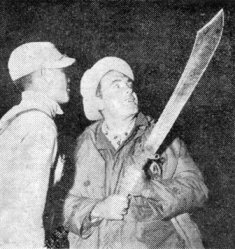 Pat O'Brien inspects a piece of Chinese ordnance, used by a local soldier guarding aircraft at a China base.
Pat O'Brien inspects a piece of Chinese ordnance, used by a local soldier guarding aircraft at a China base.
|
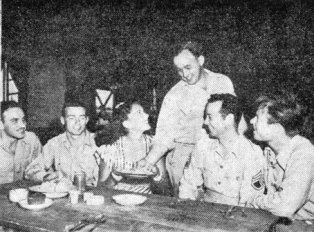 Jinx lays on the chow at a G.I. mess in China. Those present are S/Sgt. Leonard L. Gorelick, S/Sgt. J. T.
Foley, Jinx, S/Sgt. William F. Sargent, T/Sgt. F. L. Butterfield, and guitarist Jimmie Dodd.
Jinx lays on the chow at a G.I. mess in China. Those present are S/Sgt. Leonard L. Gorelick, S/Sgt. J. T.
Foley, Jinx, S/Sgt. William F. Sargent, T/Sgt. F. L. Butterfield, and guitarist Jimmie Dodd.
|
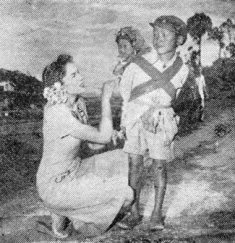 Jinx cottons up to the Chinese small fry at an Infantry training center in China.
Jinx cottons up to the Chinese small fry at an Infantry training center in China.
(Photos by Capt. Tom C. Dillard, A.C.) |
New York Drama Critic Surveys the China Scene
And Reports the Travels of Pat, Jinx & Company
(Mr. Richard Watts, Jr., author of Roundup's drama section this week, was until he came to China about two years ago, drama critic of the New York Herald-Tribune. He has now returned to the United States where, as here, he serves with the OWI. The views expressed by Mr. Watts below are very definitely those of the Editors of the Roundup. Ed.)
CHUNGKING - Just as this correspondent was getting ready to depart from this lively capital, a new troop of strolling or rather flying players, headed by Pat O'Brien and Jinx Falkenburg, paid us a visit. I'm glad I stayed over for it, since theirs was easily the most satisfying show for the American troops I have yet seen.
It came at just the right time, too, since it is giving away no secret to tell you there has been a certain amount of unpleasantness recently between some of the visitors from Hollywood and the soldiers of what was, up to a few days ago, the China-Burma-India Theater. That lively and excellent G.I. paper, the C-B-I Roundup, has in particular been indulging in a fine bit of feuding with Ann Sheridan, who is quite an embattled girl herself.
The claim, rightly or wrongly, had been that some of the thespian visitors were inclined to fancy themselves as bearing pretty terrible crosses as they traveled about the local countryside. The fine thing about the O'Brien-Falkenburg company was that there was no suggestion of martyrdom about it. The players gave every indication of having a good time, as well as providing one, and that adds decidedly to any audience's fun.
They also gave the impression that they liked, not only their audience, but each other, and that, too, is not the impression created by all the previous visitors to our citadel. All of this adds distinctly to the pleasure of an entertainment that depends for a considerable part of its success on building up an air of pleasant and likeable informality.
All in all, the O'Brien-Falkenburg Co. gave not only a good show but accomplished considerably more than that. They ended possible feeling - I am in no position to say whether or not the feeling was justified - that
|
Pat O'Brien is just right as master of ceremonies of such a show. His hearty Irish combination of sentimentality and hard-boiled wit, his gifts for story-telling, occasional serious acting and, of all things, song and his racy, engaging personality, make him just what the G.I.'s ordered. He was the spirit of the proceedings, and set the tone of the evening perfectly.
As for Miss Falkenburg, she was, to put it in terms of understatement, wonderful. It might ordinarily seem a harsh statement to make of any girl to say that she is "wholesome," but with anyone as beautiful as Jinx Falkenburg it can be said without fear of being an insult. It is in fact one of her greatest virtues that she looks not only lovely and alluring but combines those not unimportant qualities with the rare additional one of being direct and unaffected and utterly, to put it frankly, wholesome. You know that she is delightfully seductive without bothering to work at it - and that is rather an unusual tribute.
I suppose she is no great mistress at the art of song or acting. It is probably true that she sometimes misses the proper stress on a comedy line. It happens, though, that she manages her comedy scenes with such serene and humorous good nature and has in addition so much the quality of being the person you look at on stage - or elsewhere - that she is invariably a delight. I fear it is stuffy to say so, but the boys not only loved her but had deep regard for her.
The other players likewise scored genuine triumphs. It happens that this is probably the only USO troupe in history that hasn't an accordion player in its ranks, but it does have a contortionist dancer. Her name is Betty Yeaton, and, while I am a little uncomfortable in the presence of practitioners of her particular art form I was filled with awe at the casual way in which she turned around and sat down quietly on her head. Even more I admired the G.I. photographer who managed to snap her in her most complex gymnastics.
The most ecstatic applause of the evening went to a husband and wife team. Jimmy Dodd plays a guitar and sings a bit and his wife, Ruth Carrel, is a singer of popular songs and,
|
The final member of the company was a veteran piano player named Harry Brown, father of the film actor turned soldier named Tom Brown. The father isn't exactly a young man anymore, so far as years go, but he proves that his generation in the acting business is still pretty vigorous by darting about on this global wartime trip with ease and a good sense of melody.
By the strangest of coincidences it happened that I was the only American drama critic in Chungking when Pat O'Brien, the lovely Jinx and the rest of them arrived to brighten up the recollections of the theater for us Broadway exiles. Everyone I talked to came away with a sense that a good time had been had and that people in show business could be people you genuinely liked. I suspect that more important events historically were taking place in this ominous capital at the time when the actors arrived but certainly none of them was more comforting or heart-warming. Pat O'Brien and Jinx Falkenburg were good propagandists for American show business.
MODERN MARCO POLO CONS CATHAY
|
(Note:-Our peerless correspondent, tiring of commando activities at Firpo's in Calcutta, did a Marco Polo last week. His China impressions follow, in the nature of an unasked-for orientation course for those who may be shipped to the new separate Theater of Operations.)
AT THE WILLOW TREE, MARCO POLO ROAD, CHINA - China is not a land of amazing contrasts and bizarre shoppes and like that there. It is exactly like Chinatown in San Francisco - except that the paint on the walls has rusted slightly in the two thousand years since old Hung Low Pot organized the first and last "Spruce Up Week." (It was an ill-conceived venture that succeeded only in alienating the allegiance of three provinces to then-young Marshal Far Long Ting. Ting is now writing his memoirs on a terrace above Chungking).
Coming in to western China by air, you blink your eyes, thinking that some joker has pasted a contour map on the window. The contour lines below are the graceful curves of the terraced slopes, where paddies grow rice and rice and rice of assorted green and yellow colors. Closer down, the mounds of the faithful departed offer the initial point of difference from, say, California, where the tall eucalyptus trees and the poplars are the same. Also the barren, red-touched hills with their elephantine snouts and flanks of ridge.
But we'll leave Mother Nature to her own worries and proceed immediately to the fountainhead of jing pao juice, the club downtown where you can go on odd nights if you are an enlisted man and even nights if an officer. There indeed is the New Orleans of China, with gay, piquant flowers of Chinese girlhood exhibiting their warm internationalism in the dance and in the cup. As an aside, you pay $650 CN per bottle of Yuan wine and some hundreds more for pepper and gin (that's a bottle each for mixing), but the equivalent in U.S. dollars is still less than a gentleman's tip at the St. Regis, NYC. Then, while the piano player miraculously holds his little Son No. 5 in his lap and pounds out rhythm and the orchestra (some with black fedora hats on) contorts the Hit Parade, you engage in a jolly moving-around of your Chinese lotus bud on the waxed floor. About you is bubbling camaraderie, as the Tiger Cubs of Chennault revv up on good old Yuna, c'est la guerre, c'est la Chine, contact, here we go out the balcony window with flaps up.
However, we must leave the young knights and their brother armorers (that means the Air Service Command guys; knew I'd get that in somehow) and assess the virtues of the marketplace. Here, alas, the great generosity of Indian merchants is marked by the contrast, for in China the sellers put the wallas in the amateur class as banditti. A simple scarf is $500 CN (more than a buck and a half "gold," as American money is known), whereas in Calcutta the cost would be Rs. 1 As. 8. There was a camel's wool jacket that stood at the equivalent of $400 gold, but could be duplicated in Macy's for about $50, and maybe $39.95 on Amsterdam Avenue.
The merchants get rid of their wares, however, by employing the opposite psychology of that used by the Indians. The China seller just isn't interested when you snoop into his store and he will yawn and be bothered when you ask a price. To achieve a purchase you must gasp at his first price, then offer him half, and compromise in the middle, all the while smiling about, drinking his tea, and being chummy. If you get poured off at a price or the merchant's inherent bland stubbornness, you will be sold nothing that day.
At last in the gloom of the lampless city streets, with only about seven dozen nationals crowding you on all sides, you think of hiking back to the base. It's nice to think about the vefoot comforter quilts that await you, so your feet can stick out all night in the sharp weather. You look for a ride - a jeep, a 6x6, a meat wagon, anything. In a rickshaw you make the trip, for the wheels of China are few and all accounted for in the prosecution of the war. With a flourish you pass out $200 CN for the ride and receive a look of abject disappointment in exchange.
The golden moon of Marco Polo (or Donn Byrne) comes out of scroll clouds, just like Arizona in winter where they take those cowboy fadeout sequences. China has got you, no fooling, for despite the lack of transportation, there are beds with covers on them and weather to drive you under those covers; there are eggs laid by chickens, not pigeons; there is meat with blood in it; and house boys whose broad smiles confound the legend of Dr. Fu Manchu. All this and jing bao juice and swell looking China gals too.
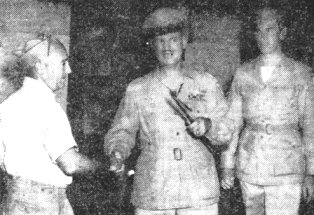 Maj. Gen. George E. Stratemeyer, commander of EAC, visits the mess at the base of the Twin Dragons, a P-38 fighter
squadron. Mess Sgt. William K. Scott, Strat (who looks as though he had just caught a whiff of eatin' food) and
Capt. William Gillespie. For the curious (like us) the badge on the general's right breast is that of an honorary
command pilot in the Yugo-Slav Air Force.
Maj. Gen. George E. Stratemeyer, commander of EAC, visits the mess at the base of the Twin Dragons, a P-38 fighter
squadron. Mess Sgt. William K. Scott, Strat (who looks as though he had just caught a whiff of eatin' food) and
Capt. William Gillespie. For the curious (like us) the badge on the general's right breast is that of an honorary
command pilot in the Yugo-Slav Air Force.
|
G.I. Station Goes On Air At Myitkyina
MYITKYINA - Radio Half-Way House is pumping a full schedule of Stateside Crossley toppers to the kids in and around Myitkyina. On the air on Sunday, October 29th, for the first time, the 50-watt G.I. station is carrying a full schedule of big-time radio shows on a regular basis, with Fibber McGhee and Molly, Duffy's Tavern, and other high-grade network stuff.
Installed by T/5 Eskil Holt and T/5 Chuck Whittier, with the assistance of lt. Robert Freiberg of the Signal Corps in the area, the station is currently operated by personnel of the local Special Service Company, under Lt. Al Davis, with T/5 Charley Purnell and Pfc. Max Fink as announcers.
Studios are in an old Burmese Temple, which got more than a little roughed up in the scrimmaging last spring and summer. The place was dubbed "Half-Way House" by some geographer who figured out that it is half-way between New York and San Francisco.
The herd of C-47's which lug in most of the freight drone overhead all day, but at night when the station is operating, most air activity ceases and the station staff can hear itself think.
The outfit is equipped to pick up remote control broadcasts from service clubs and theaters.
Three Targets Hit By B-29’s
Roundup Staff Article
Targets in Omura, Nanking, and Shanghai were attacked by Super-Fortresses, 20th Air Force headquarters in Washington announced this week.
Dock and warehouse areas of Japanese-occupied Nanking were bombed in a daylight operation of Maj. Gen. Curtis E, LeMay's 20th Bomber Command from China bases.
Bombing objectives at Shanghai were trains and shipping and storage facilities. A navy factory at Omura was hit.
A Japanese news agency quoted communiqu s saying that the Forts had raided the Dhanghai suburbs. A Jap broadcast picked up in New York said that 80 Super-Fortresses bombed Kyushu and Saishu islands.
A storm of hurricane intensity hit the Omura bombers and the planes were forced to drop their loads by instrument.
Same Old Job But New Suit
SOMEWHERE IN ASSAM - Back in the halcyon days of civilian life, Sgt. Gim Jeong and Cpl. Mack P. (for Ping) Pong, both of Vallejo, Calif., and both members of an all Chinese-American Air Service Squadron here, had had some pleasant dealings with each other.
For Jeong used to work in a grocery store in Vallejo, and Pong was a mail carrier, and since the former was in his route Pong often brought him letters. Pong would stop in the store for a coke and a chat now and then.
Then Uncle Sam called both youths into the Army at the same time. Both landed in the same squadron.
And Pong is still delivering mail - sugar reports now - to Jeong regularly, for he is the squadron mail orderly. - By Cpl. William Hoy.
|
|
By Capt. CROSBY MAYNARD Associate Roundup Editor |
It becomes more apparent with each passing week that this has becomes, for the moment, a war for ports - channels of entry through which the pipelines of supply may be filled - and kept full.
WAR IN THE EAST
In Burma, the past week has seen swift progress in execution of the southward-driving campaign toward Bhamo and, perhaps, on to Mandalay and the great port of Rangoon.
The strategic value of Bhamo in Allied hands is manifold. The capture will pave the way for the final link-up of Ledo, Bengal and the Assam railhead with the Burma Road. The Irrawaddy at Bhamo, 275 miles north of Mandalay, is navigable for river steamers of appreciable tonnage, while north of Bhamo, river traffic is limited to lesser craft.
At this week's end, it is reported that American-trained Chinese forces have reached Shwegu, west of Bhamo, while other troops are in the vicinity of Momauk, east of Bhamo. Japanese capacity to resist and retain this key position is still a matter of speculation; it is not speculation that the Allied forces will spare no effort to liquidate any Jap resistance. They will not have forgotten Gen. Joseph W. Stilwell's intense desire to return victorious to Burma, a desire now being implemented to the letter by Lt. Gen. Dan I. Sultan.
SULTAN COMMANDS CHINESE
Sultan this week took command of all Chinese forces in Burma, at the commission of Generalissimo Chiang Kai-shek, and announced that these forces would include the Chinese First Army, under Lt. Gen. Sun Li-jen, and the Chinese Sixth Army, commanded by Maj. Gen. Liao Yao-hsiang.
Sultan also made it known that American combat troops in considerable force were now in training for service in Burma. A harbinger of unhappy days ahead for the Japanese was the news that this combat force will be equipped with tanks, bazookas, and flame throwers. The latter weapon has proved very discouraging to the Nip practice of shacking up with a machine gun in a pill box. Toasted Japanese have not been of great value to the Emperor.
CHINA COMMAND
On the China side, Maj. Gen. Albert C. Wedemeyer spoke with firm candor to his first press conference, admitting that the military situation in China was unfavorable but not "irretrievable." The general did not seek to belittle current Japanese successes, but declined to take a pessimistic point of view.
It is noteworthy that this week Wedemeyer's staff was augmented by the arrival of Maj. Gen. Gilbert X. Cheves, to be supply chief for the China Theater, changing jobs with Col. Robert Neyland.
Cheves is the wiry fire-ball who took the port of Calcutta by the seat of its pants and made of it another great fountainhead of G.I. supplies.
The following paragraph sums up the story very nicely. It is extracted from a letter to Cheves from Maj. Gen. W. E. R. Covell, Commanding General, SOS, in the erstwhile CBI, on the occasion of Cheves departure for China.
"The record you leave behind you is one of which you should be proud for the rest of your life. Because of the superior energy and leadership, the efficiency of the Port of Calcutta has increased to such an extent that the Theater not only continues to lead all other Theaters but also has been No. 1 in improvement for nine out of 10 of the last half-month periods. Today, Calcutta is one of the Army's outstanding overseas ports."
With Wedemeyer, Chennault, and Cheves all on the same team, the China situation sure as shootin' isn't "irretrievable."
|
by S/Sgt. KARL PETERSON
Over in a dusty corner of the Roundup office, in a large cardboard carton which formerly contained Tootsie Rolls, is the paper's official file of poetry, or "perms" as we say on Delancey Street. Ever so often our august editor enters the office with dignified mien and announces sententiously: "Say, gang, how's for heaving a couple of those old happy poems in the rag this week?" Whereupon the various staff members pair off and stage a series of Indian wrestling competitions on the carpet - the ultimate loser becomes poetry editor for the week and settles wearily to the task of plowing through the file suitable verse.
G.I.'s in these regions are prolific and persistent poets. The mystic spell of the orient acts as the Muse's kiss on Pfc. and Colonel alike, and the mail pours in with yards of iambic pentameter, rhymed and unrhymed, sonnets, quatrains and sagas. Even the Army Nurse Corps chips in with contributions from aspiring Sapphos. It is all welcome and read with pleasure by the Roundup's raffish staff, but a policy of "news first" in our closely rationed columns of space usually squeezes the "Poet's Corner" tighter than those into which Dick Tracy maneuvers.
Themes of soldier stanzas vary widely. Many are sentimental, serious efforts on mother and sweetheart subjects, titles like That Old Photo of You, born of plain nostalgia, but the majority are lighter stuff. Fully 99% of the poems could be used with one of the following titles: We're the Unsung Heroes of This Army, Blood, Mud and Guts, Nobody Knows the Trouble We've Seen, and We Wanna Go Home. The beefs are manifold: censors, no mail, USO soldiers and draft dodgers back home. But whatever the vein, the G.I. Tennyson is sincere, in the grip of an urge and an inspiration. The best efforts are excellent, and the worst are good reading.
Sgt. Smith Dawless, the flawless, whose Conversation Piece has won wide fame, is the theater's laureate. He has lately left his beloved Ledo Road for an office near the Roundup, where he furnishes us with verse by the hour or yard for any occasion. Sgt. Elwood Jones, of an Ordnance Company up Burma way, checks in with lots of soulful copy, and there are countless others.
The letters of transmittal accompanying incoming poems are usually modest in the extreme. Pfc. J. Greenleaf Shakefellow figuratively looks shyly at the ground, twists a toe in the dust and says: "Just a l'il something I dashed off. My buddies have urged me to send it in, however, so herewith." One forthright lad escorted his verse with, "The enclosed poetry (so-called) may be of some use to you-all, it ain't no use to me."
To quote examples . . .
|
Ode to the Fighting QM, an effort in the "unsung heroes" department, leads with
Junior asking Papa what he did in the great war and winds up:
Should I speak of Tarawa, Attu and Rangoon, Of bloody campaigns in the roaring monsoon, How when wounded and weary I still carried on And boast of the medals and honors I'd won, Or should I admit the truth like a man - I issued the Spam in old Assam. In the gory division, abounding with titles like We're the CBI Guerillas of America and Fighting Yank from CBI, comes copy from members of Merrill's Marauders: They left a string of Japs a'dying From Maingkwan to Myitkyina. I first seen them on the strip there The damnedest mess I ever saw." From China we get the reflection of bitter aerial warfare in China Skies: The hum, the roar, the crack of props The Tigers grin, their blood is hot Chafing, panting, growling to go To bite and tear entrails of Zeros. |
|
The one horse that gets beaten the hardest is India, however. Sample title here is Delirious Drooling of a Dogface
Damnably Doomed for the Duration in India. A Captain sums up the great disenchantment with the Orient in his Here
Lies Our Destiny:
Travelogues and pictures tell Of India and her magic spell To those of us who in India serve Hollywood sure has its nerve. Whoever could see the false romance In snakes, tigers and poisonous plants Malaria, bugs and monsoon rains Sure demonstrates a lack of brains. Quite a lot of latrine verse has to be passed up on censorship grounds. While it may fill the editorial offices with vulgar guffaws, such pieces as The Backhouse on the Hill fail to see print, in deference to the paper's mailing privileges and a time-honored directive from above to go easy on "functional humor." |
|
Some of our contributions are sheer flights of lyric fancy, often of suspicious familiarity to poetry students, as
To a Sparrow:
O stately nimble spirit Wee pilgrim of the sky From Heaven or quite near it Your manners do imply. A few lads forward for publication fond lines penned by Stateside wives and sweethearts. One lonely WAC, in a parody to her "G.I. Joe" husband entitled I'll Be Seeing You, promises: When you cease to work As just an office jerk And you return to learn The things you've missed. I'll shed my little suit of WAC And hit the road for home For we'll take the same right track And hibernate - not roam. |
The C.B.I. Roundup is a weekly newspaper of the United States Forces, published by and for the men in China, Burma, and India, from news and pictures supplied by staff members, soldier correspondents, United Press, OWI, and Army News Service. The Roundup is published Thursday of each week and is printed by The Statesman in New Delhi and Calcutta, India. Editorial matter should be sent directly to Capt. Floyd Walter, Hq., U.S.F., I.B.T., New Delhi, India, and should arrive not later than Sunday in order to be included in that week's issue. Pictures must arrive by Saturday and must be negatives or enlargements. Stories should contain full name and organization of sender. Complaints about circulation should be sent directly to Lt. Boyd Sinclair, Hq., U.S.F., I.B.T., New Delhi, India. Units on the mailing list should make notification of any major change in personnel strength or any change of APO.

NOVEMBER 16, 1944
Adapted from original issues of CBI Roundup shared by Greg Clark and Linda James
Photos of Jinx Falkenburg, Pat O'Brien, and the USO troupe have been added to this re-creation.
Copyright © 2009 Carl Warren Weidenburner
TOP OF PAGE PRINT THIS PAGE ABOUT THIS PAGE SEND COMMENTS
PREVIOUS ISSUE CLOSE THIS WINDOW NEXT ISSUE
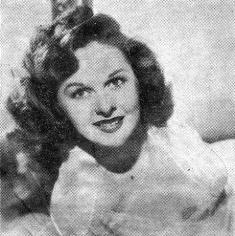 The picture above, of Hollywood's Susan Hayward, emerges as the cheeze-of-the-week. There is no news story
attached. Since when did we need excuses for running Susan?
The picture above, of Hollywood's Susan Hayward, emerges as the cheeze-of-the-week. There is no news story
attached. Since when did we need excuses for running Susan?
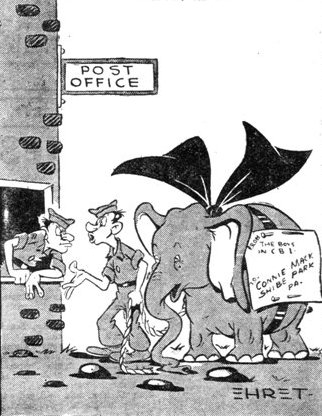
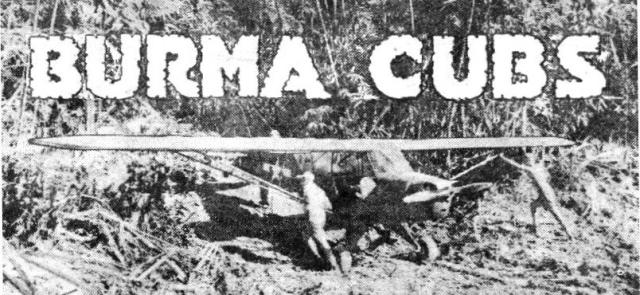
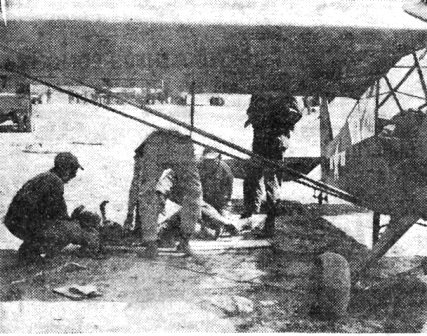 In dangerous missions, tiny L-5 liaison planes, though vulnerable to enemy attack, fly in to pick up men wounded
and almost isolated by Japs and jungle. Exhausted, grimy and unshaven, Sgt. Jack L. Mayer, one of the heroes of Burma,
is loaded aboard one of the saucy planes.
In dangerous missions, tiny L-5 liaison planes, though vulnerable to enemy attack, fly in to pick up men wounded
and almost isolated by Japs and jungle. Exhausted, grimy and unshaven, Sgt. Jack L. Mayer, one of the heroes of Burma,
is loaded aboard one of the saucy planes.
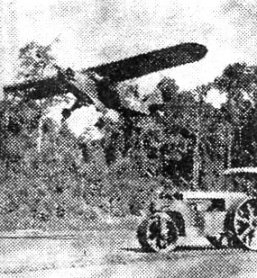 A liaison plane attached to combat troops takes off from a landing strip along the Ledo Road. Planes used the field
even when it was under construction.
A liaison plane attached to combat troops takes off from a landing strip along the Ledo Road. Planes used the field
even when it was under construction.

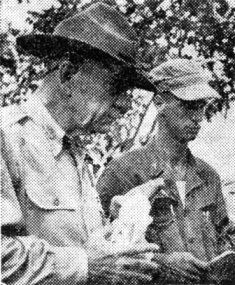 Lt. Gen. Dan I. Sultan, Commanding General of the I-B Theater, inspects troops in the field. The other gent in
the photo is Col. Ernest Easterbrook.
Lt. Gen. Dan I. Sultan, Commanding General of the I-B Theater, inspects troops in the field. The other gent in
the photo is Col. Ernest Easterbrook.
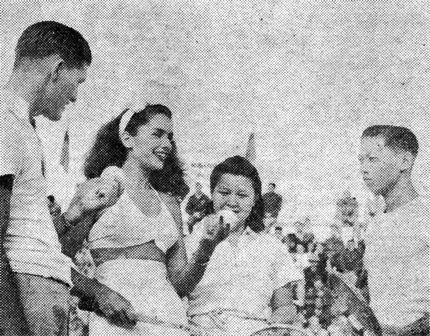 Left to right, meet Sgt. Calvin Dow, Miss Jinx Falkenburg, Mrs. Winifred Wang Chien and Eddie Ma. La Falkenburg,
who hadn't touched a racquet in four months, and Dow, lost to the Chinese doubles team, 6-2, 6-2.
Left to right, meet Sgt. Calvin Dow, Miss Jinx Falkenburg, Mrs. Winifred Wang Chien and Eddie Ma. La Falkenburg,
who hadn't touched a racquet in four months, and Dow, lost to the Chinese doubles team, 6-2, 6-2.
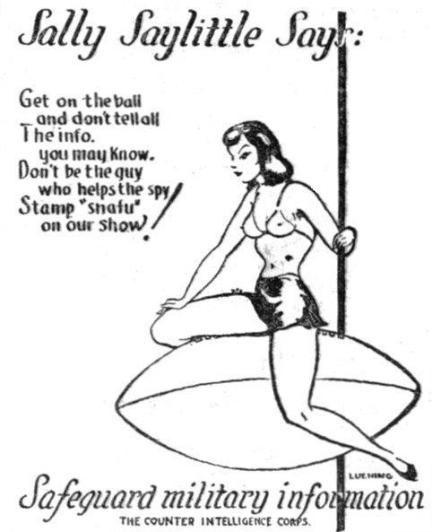
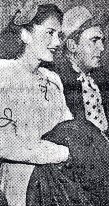 Jinx Falkenburg and Pat O'Brien arriving in Chungking.
Jinx Falkenburg and Pat O'Brien arriving in Chungking.
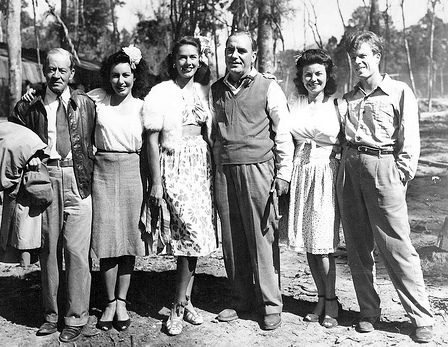 Harry Brown, Betty Yeaton, Jinx Falkenburg, Pat O'Brien, Ruth and Jimmy Dodd.
Harry Brown, Betty Yeaton, Jinx Falkenburg, Pat O'Brien, Ruth and Jimmy Dodd.


